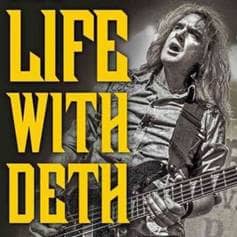
Now the father, who used to get high for an escape has been clean since 1999, attends his kid’s volleyball tournaments and is studying to become a Lutheran pastor. Ellefson additionally launched contemporary worship services called Mega Life Ministries at Shepherd of the Desert Lutheran Church in Scottsdale, Arizona.
Quite a shift, but why reveal his private life to the masses? Initially he didn’t want to.
“I had no desire to have a reality TV show or those kinds of things. Some things are sacred for me and my family is one of them. After a few years of absence from Megadeth [over a decade] I came back in 2010. It was big news for Megadeth and it was big for heavy metal.” The “Big Four of Thrash” Metallica, Anthrax, and Slayer were all together. “I was approached by Joel McIver. He interviewed me for bass magazines and I trusted him and I trusted his foresight,” said Ellefson. “I wanted to be respectful about past members. I wanted to be respectful about my family.”
Ellefson dived into his Christian walk in the book knowing that the metal community would cringe.
“There are matters of spirituality [in the book] that are hot button topics with metal fans. That’s a big part of my life today. A lot these books tend to be the crash and burn and the race to the bottom. All that stuff in my life is a quarter century ago. I didn’t see any reason to celebrate that to sell books.”
Fans were already acquainted with leadman Dave Mustaine and Ellefson’s stand on faith in a 2001 VHI documentary as they discussed drugs and reawakening of faith during recovery. Megadeth was part of a young culture of sex, drugs and rock n’ roll—one long wild party. But the page turned.
“We certainly suffered some criticism from some people. They want to hear about rock n’ roll and not about faith,” Ellefson said. “To them rock n’ roll represents to them anti-faith. And I get it. I really don’t to talk much about it [faith] unless someone asks. You don’t have to walk around saying “Jesus Saves,” but when someone asks, give an account. I live my life more along those lines. There have been people in the religious community that had a harder time with it because of what a Christian supposed to look like and do for a job and [their] lifestyle.”

